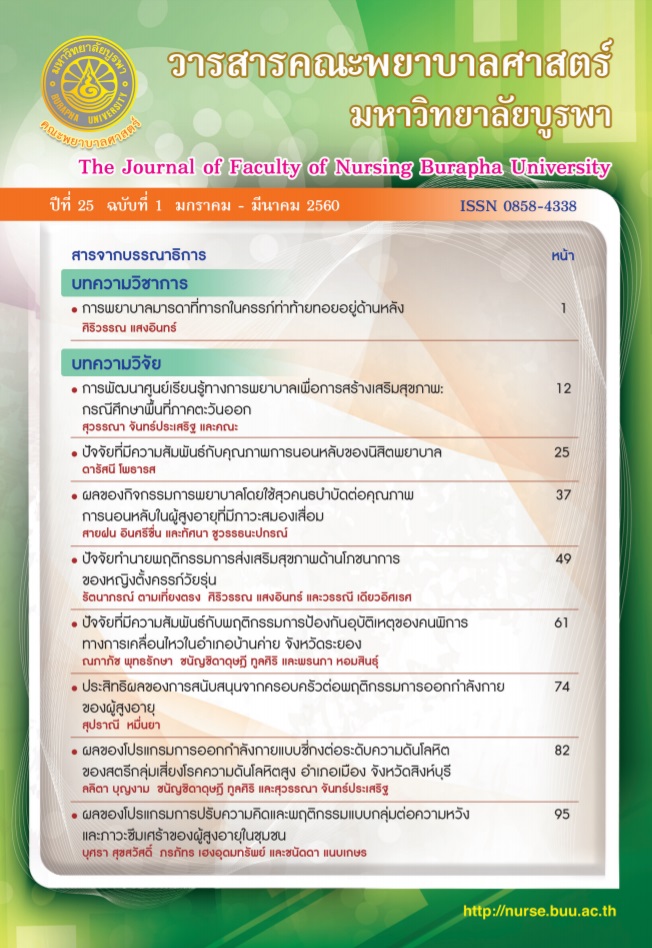ผลของกิจกรรมการพยาบาลโดยใช้สุวคนธบำบัดต่อคุณภาพการนอนหลับในผู้สูงอายุ ที่มีภาวะสมองเสื่อม*
คำสำคัญ:
คุณภาพการนอนหลับ, กิจกรรมการพยาบาลโดยใช้สุวคนธบำบัด, ผู้สูงอายุที่มีภาวะสมองเสื่อม, Quality of sleep, Nursing care using aromatherapy, Older persons with dementiaบทคัดย่อ
การวิจัยครั้งนี้เป็นการวิจัยกึ่งทดลอง มีวัตถุประสงค์เพื่อเปรียบเทียบคุณภาพการนอนหลับในผู้สูงอายุที่มีภาวะสมองเสื่อม ก่อนและหลังได้รับกิจกรรมการพยาบาลโดยใช้สุวคนธบำบัด และเปรียบเทียบคุณภาพการนอนหลับในผู้สูงอายุที่มีภาวะสมองเสื่อมระหว่างกลุ่มที่ได้รับกิจกรรมการพยาบาลโดยใช้สุวคนธบำบัด กับกลุ่มที่ได้รับการพยาบาลตามปกติ กลุ่มตัวอย่าง เป็นผู้ที่มีภาวะสมองเสื่อมระยะที่ 1 และ 2 อายุตั้งแต่ 60 - 85 ปี ในสถานพยาบาลเดอะซีเนียร์ จำนวน 44 คน เป็นกลุ่มทดลอง 22 คน และกลุ่มควบคุม 22 คน โดยกลุ่มควบคุมได้รับการพยาบาลตามปกติ กลุ่มทดลองได้รับกิจกรรมการพยาบาลโดยใช้สุวคนธบำบัด เป็นระยะเวลา 4 สัปดาห์ เครื่องมือที่ใช้ในงานวิจัยประกอบด้วย โปรแกรมกิจกรรมการพยาบาลโดยใช้สุวคนธบำบัด และแบบประเมินคุณภาพการนอนหลับ มีค่าความเที่ยงของเครื่องมือเท่ากับ .83 วิเคราะห์ข้อมูลโดยใช้สถิติทดสอบค่าที (Dependent t-test และ Independent t-test) ผลการวิจัยพบว่า
1. คุณภาพการนอนหลับของผู้สูงอายุที่มีภาวะสมองเสื่อม หลังได้รับกิจกรรมการพยาบาลโดยใช้สุวคนธบำบัด ดีกว่าก่อนเข้าร่วมโปรแกรม อย่างมีนัยสำคัญทางสถิติที่ระดับ .05 (p < .05)
2. คุณภาพการนอนหลับของผู้สูงอายุที่มีภาวะสมองเสื่อม กลุ่มที่ได้รับกิจกรรมการพยาบาลโดยใช้สุวคนธบำบัด ดีกว่ากลุ่มที่ได้รับการพยาบาลปกติ อย่างมีนัยสำคัญทางสถิติที่ระดับ .05 (p < .05)
This quasi-experimental research aimed to compare sleep quality in older persons with dementia before and after receiving nursing care using aromatherapy and to compare sleep quality in older persons with dementia between the experimental group and control group. A sample was 44 men and women aged 60 – 85 years in the Senior Hospital. They were divided into 2 groups: 22 persons in each group. The control group received conventional nursing care while the experimental group received the nursing care using aromatherapy for four weeks. The instruments of this study were the nursing care with aromatherapy program and the Pittsburgh Sleep Quality Index with the reliability was .83. Data were analyzed using descriptive, dependent t-test and independent t-test. The results were summarized as follows:
1. The quality of sleep in older persons with dementia after received the nursing care using aromatherapy was significantly better than before receiving the program. (p < .05).
2. The quality of sleep in older persons with dementia after received the nursing care using aromatherapy was significantly better than the subject receiving conventional care. (p < .05)





